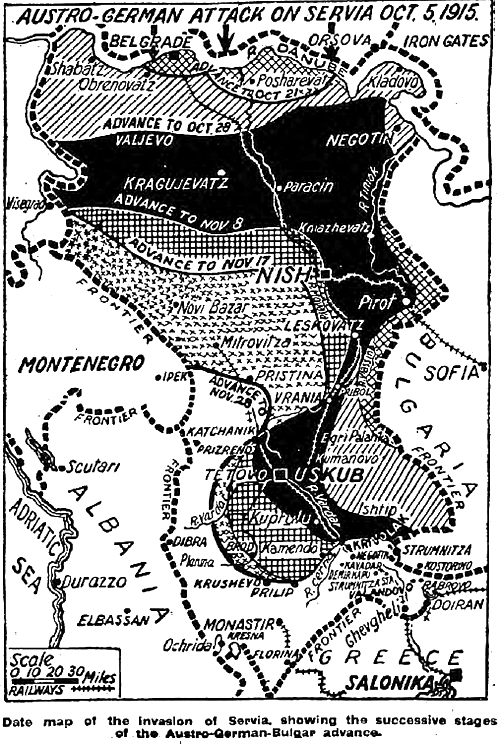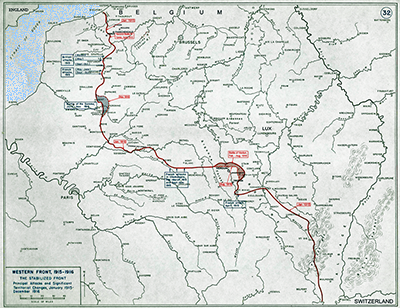First World War Project
Home News - November 1915
The Western Front continued largely "stabilised" from January 1915 to the end of 1916.
The disaster that was "The Dardanelles/Gallipoli Peninsula Campaign" was summarised soberly in his Official Despatch written on 6th March 1916 (covering these latter months of 1915) by General Sir Charles Monro who argued for and then arranged total evacuation under the noses of the Turkish forces:
"The positions occupied by our troops presented a military situation unique in history. The mere fringe of the coast line had been secured. The beaches and piers upon which they depended for all requirements in personnel and material were exposed to registered and observed Artillery fire. Our entrenchments were dominated almost throughout by the Turks. The possible Artillery positions were insufficient and defective. The Force, in short, held a line possessing every possible military defect. The position was without depth, the communications were insecure and dependent on the weather. No means existed for the concealment and deployment of fresh troops destined for the offensive - whilst the Turks enjoyed full powers of observation, abundant Artillery positions, and they had been given the time to supplement the natural advantages which the position presented by all the devices at the disposal of the Field Engineer."
Underscoring the seriousness of the Allied position, (3rd November) the first meeting was convened of the newly-constituted War Committee of British Cabinet to replace the Dardanelles Committee. The next day, Lord Kitchener left for the Dardanelles, arriving on the 10th.
The more pressing priority was to strengthen the Western Front. While the theatre of war in Western and Central Europe created its own media reporting. Increasingly, the Home Front was made aware of the Russian, Italian, African, Middle East, and Mesopotamian/Turkish theatres. On the 23rd, Greece was put under pressure by Entente Powers not to interfere with passage of troops, the Greeks accepted those demands the next day.
After unexpectedly rapid progress against Turkish/Ottoman forces on their way towards Baghdad, the British an Indian forces were brought up sharply and forced (22-26th November) to retreat from Ctesiphon to Kut al Amara by the Turkish troops under Yusef Nur-ed-Din. The Allies lost more than half their 8,500 troops (killed or wounded).
November ended (30th) with the formal signature of the Pact of London by Great Britain, France, Russia, Japan, and Italy. This defined the shape of the war at that time.
Lynsted Embezzlement
| South Eastern Gazette of 9th November 1915 |
| FAVERSHAM COUNTY POLICE COURT. At the Country Petty Sessions on Thursday [4th November], Mr. Frederick Neame, a new magistrate, took his seat on the Bench for the first time, and was welcomed by Mr. Charles Cremer, who was presiding. Ernest Walter Coultham, labourer, of Oversland, was charged on remand with stealing a quantity of wheat, value 2s., the property of George Ernest Colyer, of Rhode Court Farm, Selling, on Oct. 22nd. He pleaded guilty, stating he took the wheat from under the threshing machine for his rabbits and he thought there was no harm in doing that. Supt. Lawrence stated that in 1903 the defendant was convicted for embezzlement at Lynsted. Mr. Colyer said he would like to say in Defendant's favour that he was always a willing helper in any charitable cause in the district. The Bench sentenced defendant to seven days' hard labour. |
Matches in explosives factory
| Whitstable Times and Herne Bay Herald of 27th November 1915 |
| A DANGEROUS PRACTICE. Alfred Frederick Baker, a youth, of Barrow Green, Teynham, was fined 15s. For taking matches on to the works of the Cotton Powder Co. contrary to the regulations on November 6th. The Chairman said that his dangerous practice must be stopped and future offenders would be dealt with more severely. Mr. Foley, foreman, said that as defendant's mother was a widow the Company would pay the fine. |
Sittingbourne Petty Sessions: Criminal acts
| Whitstable Times and Herne Bay Herald of 13th November 1916 |
| SITTINGBOURNE -
NON-COMPLIANCE WITH VACCINATION ORDER. - Sittingbourne Petty Sessions on Monday [8th November] Percy S. Payne, coal merchant, was fined 10s. for non-compliance with a vaccination order that was made in July last. MOTOR CAR ACCIDENT.- The Hon. Mrs. Parry-Evans, wife of the Vicar of Sittingbourne, met with a rather alarming accident in London a few days ago. A motor van ran on to the pavement in Kensington, knocking down Mrs. Parry-Evans was badly cut on both knees, and has been obliged to keep to her bed for some days in consequence. ALLEGED THEFT BY BARGEMAN. - At the Petty Sessions on Monday Charles Allard, aged 72, giving an address at Cheriton, was charged with stealing a quantity of clothing, valued at £3, the property of John William Austin, captain of the barge Teetotaler, at Milton, on November 2nd or 3rd. The clothes disappeared, and so did Allard, but he was traced to a lodging-house at Upper Stone Street, Maidstone, where most of the articles were recovered. A pair of knee boots had been pawned with Messrs. Clift, Chatham. When apprehended Allard admitted taking the missing articles. The accused was committed for trial to the Kent Assizes. |
† - Twentieth Loss in the Kingsdown with Creekside Benefice - 9th November; Pink Hill Cemetery, Turkey.
Sergeant Philip DALTON (of Cellar Hill, Lynsted), Killed in action, aged 29 years |
Beaten with a pail!
| Whitstable Times and Herne Bay Herald of 27th November 1915 |
| A WATERY CASE. Clara Jones, of West End, Lynsted, was summoned for assaulting Slinea Lyons at Lynsted, on November 12th. Complainant, who lives two doors away from defendant, stated that she had to sweep some water away in the yard when defendant threw a pail of water over her. She also cracked her on the head with a pail causing blood to flow. She (witness) then threw some water over the defendant. Annie Jones, a little girl, corroborated. Defendant stated that complainant swept the water into her doorway, and she emptied a pail of water down the bricks as there was nothing but mud and ashes. Defendant then threw some water over her, and she threw a pail at her, but it did not touch her. Complainant then took up a pail of dirty water and threw over her. Eleanor Dennis, of Austin's Cottages, Greenstreet, corroborated. The Bench dismissed the case, the Chairman saying that they felt it ought never to have been brought there as it was evidently a neighbours' quarrel. They hoped that in future they would live in harmony together. Mr. French, J.P., did not adjudicate in this case. |
Railway collision at Faversham
| South Eastern Gazette of 23rd November 1915 |
| RAILWAY COLLISION AT FAVERSHAM. GUARD INJURED. On Thursday morning [13th November], shortly before six o'clock, a collision occurred on the railway at Faversham Station, an empty passenger train, which had come up from Canterbury, running into a goods train which was stationary on the up road. There was a thick fog at the time. The brake van and two or three trucks at the rear of the goods train were damaged, and the front wheels of the passenger engine left the rails. Happily, there were no fatalities, but Guard Leonard of the goods train, who lives at Faversham, was cut about the head and had to be taken to the Cottage Hospital. A breakdown gang was soon at work and traffic was not seriously delayed. |
Nonogenarian from Greenstreet - funeral
| South Eastern Gazette of 23rd November 1915 |
| GREENSTREET NONAGENARIAN. The funeral took place at Lynsted on Wednesday [17th November] of Mrs. George Champ, of Greenstreet, who had reached the great age of 90 years. For 50 years she had been a member of the Greenstreet Wesleyan Church, for 36 of which she was a teacher in the Sunday School. Among the wreaths at the funeral was one from the members and friends of the Church. |
17th November: British hospital ship "Anglia" sunk by mine off Dover.
| Dover Express of Friday 19th November 1915 |
HOSPITAL SHIP SUNK. "ANGLIA" MINED IN THE CHANNEL. LOSS OF 85 LIVES.
The First Lord of the Admiralty has received from Lord Stamfordham, on behalf of the King, the following telegram:-
The news of the occurrence reached Dover early in the afternoon, and created great consternation, as at first it was stated that the whole of the cot cases, some 200 in number, had been lost. This fortunately was not so. The survivors were brought to Dover in several vessels. Some were dead, and these and others who were in a serious state were taken to the Military Hospital, while three bodies were handed over to the police and placed in the Mortuary. Two of the bodies those of soldiers have been removed to the Military Hospital, where there are now eight bodies, and it is expected that an inquest will be held on the other which is that of a steward. |
Collecting names of serving men
| East Kent Gazette reported of 20th November 1915 |
| GREENSTREET- THINKING OF "THE BOYS" – Will the residents of Lynsted and Teynham, who have relatives in the Army or Navy, give their names and numbers to Mr. H.A.J. Peasnall, "The Pharmacy", Greenstreet, so that a Christmas greeting may be forwarded to them? |
† - Twenty-first Loss in the Kingsdown with Creekside Benefice - 21st November; Hedge Row Trench Cemetery, Ypres, Belgium.
Private Frederick GODFREY (of Lynsted), Killed in action, aged 34 years |
Cyclists at Oare punished for bright lights and no lights!
| Whitstable Times and Herne Bay Herald of 27th November 1915 |
| FAVERSHAM COUNTY PETTY SESSIONS [25th November]. CYCLISTS IN TROUBLE. Sidney Simmons, of 29, Cromwell Road, Whitstable, William Beesley, of Banks Cottage, Teynham, Walter Venner, of Lactus Cottage, Ospringe, William Hudson, of 36, Priory Row, North Preston Without, Alfred Bourne, of Pig Green, Eastling, and Frank Hudson Metcalfe, of Saxon Road, Faversham, were summoned for having lights on their cycles of greater brilliance than was necessary for the public safety at Oare on various dates. The Bench fined Simmons, Venner, Hudson, and Brown 5s. each, Beesley 7s.6d., and Metcalfe 10s. The Chairman said that cyclists using acetylene lamps must shade the upper part, and in future cases the fines would have to be increased. William Wilshire, attached to the National Reserves, and one of the main gate guard at the Cotton Powder Works, was fined 10s for riding a bicycle without a light at Oare on October 26th. He said he was not in a position to pay the fine as being a non-efficient soldier he only got 2s. a week. The Bench allowed him 21 days to find the money. Thomas Martin, 37 South Road, Faversham, was fined 5s. for riding a cycle without a red rear light at Oare on October 28. |
ARTEFACTS - Background Records...................
Map of opposing formations in 1915


Balkan Front from 5th October: Daily Express of 29th November 1915


 World War 1 Pages
World War 1 Pages